11 signs of stress - and expert tips on how to deal with them
What stress is, how to cope with the symptoms, and where to turn for help.
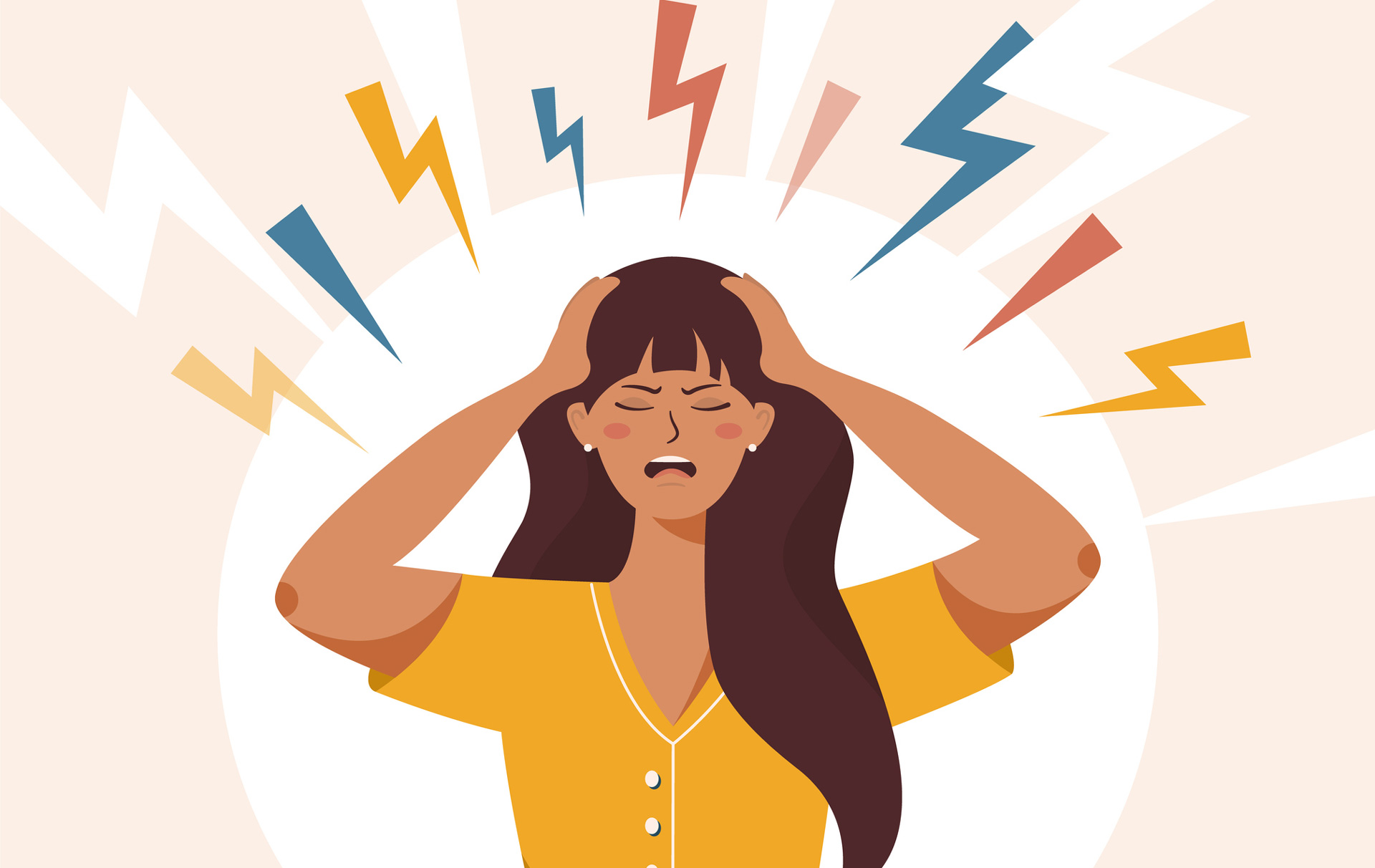
Debra Waters
It's not unusual, in our busy lives, to have stressful days. But what happens when those days occur too regularly and we become overwhelmed? Know the signs of stress and you can find ways to manage uncomfortable symptoms and relieve the strain.
It's normal and healthy to have some level of stress in our lives. Stress, to some extent, keeps us going and can actually be good for us. But modern life can generate too much of it and that's when we come unstuck. The result can be myriad symptoms – from stomach pain to insomnia.
Chief De-Stressing Officer of The Stress Management Society Neil Shah is keen to debunk a common myth – that we should live our lives completely stress-free. He told us, "Stress is a nearly universal human experience. We all, at some point in our lifetime, have experienced it. Without the stress response, humankind wouldn’t have survived to experience the 21st century. Our cavemen ancestors used the onset ‘fight or flight’ stress response to equip them to deal with threats and danger," he says.
A little stress gives us the get up and go to achieve short- and long-term goals. Moreover, it can protect us. Neil explains why: "In the modern world, this ‘fight or flight’ mode can still help us survive dangerous situations, such as reacting swiftly to a person running in front of our car by slamming on the brakes."
The challenge, Neil explains, is when we're stressed in inappropriate situations. "When blood flow is going only to the most important muscles needed to fight or flee, brain function is minimised," he says. "This can lead to an inability to ‘think straight’; a state that is a great hindrance in both our work and home lives. If we are in a state of stress for long periods, it can be detrimental to our health."
What is stress?
Much like the signs of anxiety, and signs of depression, stress is a physical response to challenging situations that can also cause psychological problems. When we are stressed, our body releases a variety of chemicals and hormones such as adrenaline, cortisol and norepinephrine to provide us with energy and alertness. We suffer if this energy isn't channelled correctly.
Everyone handles stress differently and one person's tipping point won't be another's. Our ability to handle stress depends on personality, life experience, genes and our current circumstances. What stress isn't is just pressure, however. Sir Cary Cooper, a Professor of Organisational Psychology & Health at the University of Manchester and a clinical advisor to Anxiety UK, the UK’s leading user-led anxiety charity, explains why they're not the same thing. "There is a difference between pressure and stress," he says. "Pressure can be stimulating and positive. But when pressure exceeds an individual’s ability to cope then you are suffering from stress."
GoodtoKnow Newsletter
Parenting advice, hot topics, best buys and family finance tips delivered straight to your inbox.
In a nutshell, stress is when you have too many demands put upon you that you're reasonably able to manage or have the resources for.
Signs of stress can be both physical and behavioural. "Behavioural symptoms are associated with changes of behaviour," says Professor Cooper. "While physical symptoms can take many forms: difficulty sleeping, feeling anxious most of the time; gastrointestinal problems, palpitations and headaches, etc," he continues.
11 signs of stress
1. Changes in behaviour
One of the first psychological signs of stress is changes in our personality. If you find yourself or someone close to you behaving differently, it could be in response to overly demanding situations.
For example, says Professor Cooper, extrovert people become withdrawn; when usually humorous they lose the sense of humour; when normally friendly they become aggressive. "The change of behaviour over a period of time is an indication that the individual has moved from the pressure zone to the stress zone," he explains.
Prolonged stress can have a negative effect on our mental health. Research shows that it can alter the 'pleasure chemical' dopamine in our brains, explains Dr Rhianna McClymont, Lead GP at digital healthcare provider, Livi. "This is one of the reasons long-term stress makes us more vulnerable to mental illness," she says.
How to ease it: If you find you're snapping at loved ones or feeling unusually grumpy, try calming your mind. 'Breathing exercises, mindfulness techniques and meditation have become popular stress management strategies over the last few years, and they’re supported by good clinical evidence," says Dr McClymont. One study, for example, found that focusing on the present moment – an aspect of mindfulness – can help people adapt and cope with stressful moments. The Headspace app (from £14.17 a month) is an excellent resource at your fingertips that offers guided meditations and mindfulness techniques. According to a study published in PLOS ONE, practising mindfulness meditation for 10 days, using the Headspace app, reduced stress by 14%.
https://www.instagram.com/tv/CXvXnh1l6zz/?utm_source=ig_web_copy_link
2. Anxiety
One of the most common signs of stress is anxiety. This can lead to physical symptoms – such as heart palpitations and a racing heart – as well as feelings of worry, fear and agitation.
How to ease it: Anxiety, depression and stress often come hand in hand. "It may be that counselling would help a person to manage stress more easily," says Geri Burnikell, a spokesperson for SupportLine – a telephone helpline that provides confidential emotional support to those who are isolated or at risk (call 01708 765200 for advice).
Geri continues: "Counselling will help you look at ways of eliminating unnecessary stress, ways of learning positive healthy ways of coping with stress, and the importance of not letting stress build up to a point where it becomes overwhelming." The mental health charity Mind has some useful info on how to find a therapist.
It's also important to stay in touch with close friends and family. Stress can make us irritable and withdrawn at a time when we most need extra support. "Even when you don’t feel like it, trying to maintain your social life is important," says Dr McClymont. "It might even help to talk to friends and family about what’s going on in your life, but if you’re not comfortable with that just socialising with them can help you feel more positive."
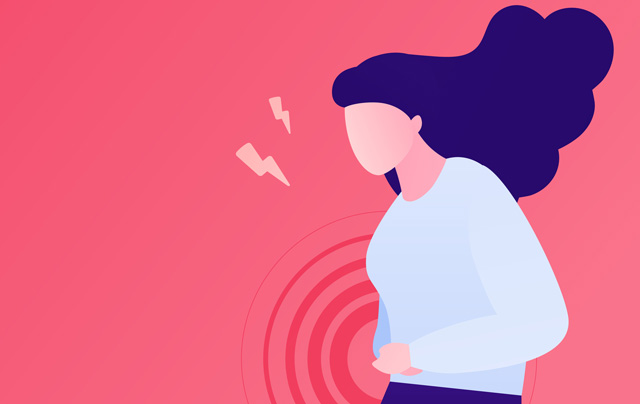
3. Stomach problems
An upset stomach, poor digestion and IBS can all be attributed to stress. This has become especially prevalent in recent years as experts learn more about the Microbiome Gut Brain Axis (MGBA). This is the symbiotic relationship between our gut health and our brain and, therefore, our mental health. For instance, stress can have a negative effect on the bacteria on our gut, increasing the risk of leaky gut, which can result in inflammatory bowel disease (IBD).
How to ease it: There's increasing evidence that live bacteria known as probiotics – when taken either in supplement form or by eating certain foods – can ease stomach issues and relieve signs of stress. Studies show that, in some cases, probiotics influence certain neurotransmitters, as well as cortisol (the 'stress hormone') and serotonin (the 'feel-good hormone'), which may ease mental health issues such as anxiety and depression. Research is proving so promising that probiotics have been dubbed 'psychobiotics' due to their benefit on both the gut and brain.
You don't need to have stomach problems to benefit from probiotics. Try Bio-Kult Brighten (£14.95 for a 60 day supply | Amazon), which contains 14 live bacteria strains as well as calming B vitamins, magnesium and zinc. Alternatively, give Symprove a go. While it's a more expensive option (£79 for a four week supply | Amazon) it's highly rated and it comes as a liquid – a better option for those who don't like taking tablets. Eat more probiotics, too – so include more kimchi, miso, sauerkraut and yogurt in your diet.
4. High blood pressure
One of the potentially more concerning signs of stress is high blood pressure. Known as the 'silent killer', high blood pressure (or hypertension) can lead to a host of problems. Untreated, it can increase the risk of aneurysm, dementia, heart attack, kidney failure or stroke.
While it's debatable whether stress causes long-term high blood pressure (our blood pressure should go back to normal after a stressful events, says the British Heart Foundation), what chronic stress may lead to is an unhealthy lifestyle – such as smoking, drinking and eating junk food – which can raise blood pressure.
How to ease it: If you're stressed it's advisable to get your blood pressure tested by your GP. You can also buy a home blood pressure monitor, though it's always wise to get expert advice from a health professional. If your readings are frequently high look at ways to reduce your blood pressure. Regular exercise, cutting down – or better still – quitting alcohol, caffeine, salt and smoking, and losing weight can lower blood pressure. Meditation, mindfulness and breathing exercises are also very beneficial.
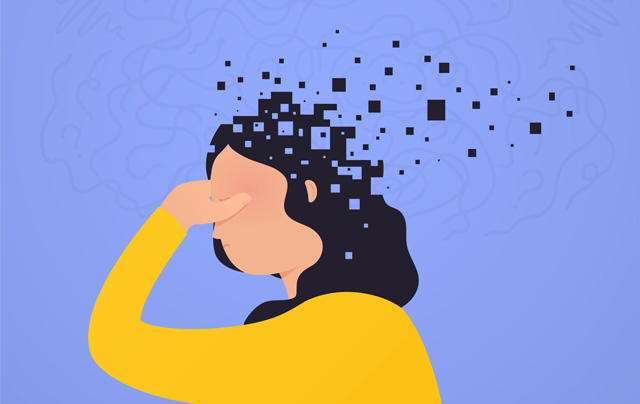
5. Forgetfulness and disorganisation
What makes you more stressed when you're already stressed? Losing your car keys? Forgetting a friend's birthday? These moments are common signs of stress and, again, we have cortisol to blame.
Cortisol can interfere with the formation and recollection of memories, especially during sleep when our brains consolidate memories, according to research. So, when we are regularly stressed, this impacts on our ability to remember things, including learning and the ability to do our job effectively. Indeed, being forgetful and disorganised are also indicative of burnout. This – like stress – is when we are overloaded to the point of exhaustion.
How to ease it: If you are trying to do too many things at once, the chances are that if you manage to achieve them all, they won't have had the same level of your focus as if you'd concentrated on one task at a time. In fact, research shows that multitasking negatively affects our performance and possibly even our IQ! Slow down and see where you can simplify your life. At the very least, avoid obsessively scrolling through your phone. Neil suggests spending less time on your devices. With the time you gain, aim to plan your day on paper instead, read a book, write in a journal or meditate. Even 10 minutes twice a day can make a big difference.
6. Increase in blood sugar
When we're constantly dealing with life's demands, the body adapts in numerous ways. One organ that responds is the liver, which releases extra glucose to help us manage stress. However, if our stress is chronic, this regular boost of glucose can affect blood sugar levels. "Long-term, this constant release increases our risk of developing type 2 diabetes," explains Dr McClymont. "And it can make it hard for us to maintain a healthy weight."
Although stress doesn't cause diabetes, it can worsen a pre-existing condition and may contribute to the development of type 2 diabetes. According to researchers at Diabetes UK 'high levels of stress hormones might stop insulin-producing cells in the pancreas from working properly and reduce the amount of insulin they make.'
How to ease it: Symptoms of high blood sugar include feeling thirsty and needing to wee more often, tiredness and blurred vision. Your doctor can test to see if you're prediabetic or diabetic. In the meantime, give your liver a break. Avoid alcohol (which is, in itself, a stimulant that may provide temporary relief but isn't good for stress), refined and sugary foods.
"One of the best things we can do for our physical and mental health is to eat a healthy diet," says Dr McClymont. "This means lots of fruit and vegetables, wholegrains, and lean proteins." Following a Mediterranean diet is recommended.
7. Difficulty sleeping
A lack of sleep and stress are inexorably linked. One can create the other and vice versa, leading to a vicious cycle where the more stressed you are at not being able to sleep the less you sleep – and the more stressed you become. Sound familiar?
"Getting enough sleep and sticking to regular hours can make a huge difference to how well we cope with everyday stress," says Dr McClymont. While that's easier said than done (according to one report more than 4 in 10 adults said poor sleep in the past month made them feel more stressed and overwhelmed) there are ways to make sleeping a more tempting and less anxiety-inducing prospect.
How to ease it: Make a concerted effort to improve your sleep hygiene. There are a number of changes you can make. If possible, try to get some exercise and fresh air during the day, change your mattress or bedding if they're uncomfortable and take a warm bath with magnesium flakes before bed (we like BetterYou's Magnesium Sleep Mineral Bath Flakes, £9.95 | Superdrug) as this will help your muscles relax. Try to sleep in a well-ventilated room – according to The Sleep Charity the optimum temperature for a good night's sleep is a relatively cool 16-18°C (60-65°F).
"Remember that stimulants like late-night screen time, alcohol, big meals and nicotine can stop us getting to sleep," adds Dr McClymont. "Caffeine can affect us six hours after drinking it, so cut out the coffee early in the afternoon," she advises.
You could also buy a CBD supplement. According to one questionnaire of 5,000 adults, 1 in 7 consumers who buy CBD use it to relieve anxiety and stress. "CBD has been shown to interact with several receptors which regulate fear and anxiety-related behaviours, including serotonin receptors," says Dr Leon Barron, a GP and tutor at UCL Medical School. “There has been a lot of research into the use of CBD for anxiety, and good evidence of benefits."
If you're unsure about trying CBD you could sample a soothing tea – Aldi's Diplomat Night Time Infusion is getting rave reviews and costs a mere 69p for 20 teabags. Or, if you prefer, opt for Dozy Bears Gummies (£16.99 | AMAZON). Containing a blend of botanicals and vitamins as well as 5-HTP and tryptophan, this supplement can help relax you and aid sleep. However, always check with a health professional before taking supplements. For example, if you're on certain antidepressants it's better to avoid 5-HTP.
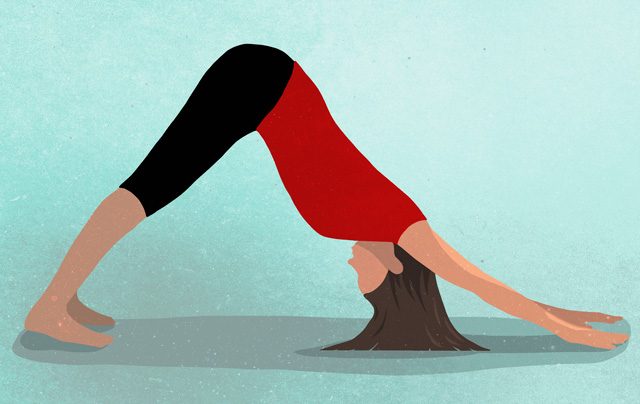
8. Headaches or migraines
Different types of headaches, as well as migraines, are all symptomatic of a stressed body and mind. Stress is a very common trigger for headaches. Poor posture and tension – which being anxious and wound-up causes – are also triggers.
"The release of stress hormones [such as cortisol] can cause changes in the blood vessels around the brain, causing tension headaches and migraines," says Dr McClymont. For example, one study found a link between 'stress let-down' – the day after a stressful day – and an increase in migraine attacks, leading the researchers to surmise that regular stress management is key to the prevention of headaches, rather than allowing the stress to build then be released.
How to ease it: Regular exercise is a brilliant way of preventing cumulative stress. Scientists believe that although exercise initially raises the body's stress response, activity then seems to lower stress hormones, resulting in reduced stress levels overall. The key is frequency – exercising most days will help to keep stress levels under control. Aim for a daily walk or cycle, or a relaxing yoga class. Signing up to Gympass is a good incentive – from £7.99 a month you can get access to gyms, studios and wellbeing apps.
"Exercise is particularly good for stress relief," says Dr McClymont. "Even a little bit of time outdoors can energise us. And it can help us maintain a good sleep pattern and improve our mental and physical health."
9. Frequent colds and infections
One of the most common signs of stress is getting run-down and frequently sick. Numerous studies link stress to a reduced immune system, slow wound healing, an altered immune response to vaccinations and even cancer.
"Stress initially inhibits the immune system," says Dr McClymont. "The chemicals our body releases to deal with immediate threats aren’t designed to keep us healthy long-term. People affected by chronic stress can find their immune system affected, making them susceptible to colds, flu and other infections."
How to ease it: Take up a mind-body therapy such as yoga, Tai-Chi or meditation. Meta-analysis of 34 studies found that these therapies can have a positive effect on the immune system and an individual's antibody response to vaccines. Listening to music can also be very calming. Search for 'music for stress' on YouTube for an array of playlists to lower your heart rate and help calm your mind.
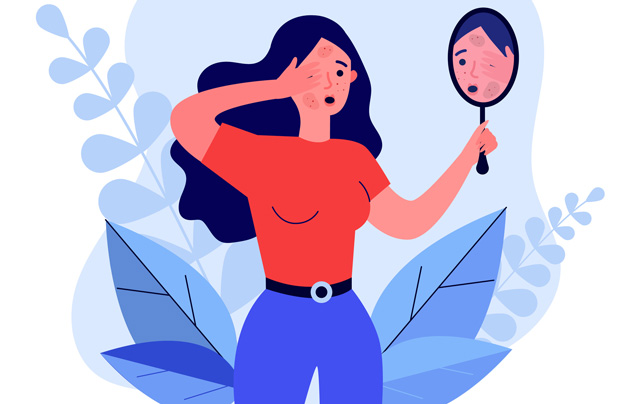
1o. Skin issues
Just to add to your woes, stress can also cause breakouts and aggravate skin conditions, such as eczema and psoriasis. This is partly because stress affects our immune system and increases inflammation in the body. This then has an effect on our skin health. Hives and an itchy scalp are also signs of stress.
You skin may also suffer because your diet changes. You may eat more sugary or refined 'comfort' foods. Or drink more alcohol and caffeine and sleep less – actions which can contribute to problem skin.
How to ease it: Take care of your skin during stressful times by taking care of yourself. Eat and sleep well to the best of your ability and find ways to relax. Stress causes us to let our self-care routines go. If this rings true, set reminders to take off your make-up and moisturise after showering. An omega-3 fish oil supplement can give your skin a much-needed boost.
For people suffering from psoriasis, one pilot study found that psoriasis sufferers who underwent CBT with mindfulness showed a significant improvement in the severity of their skin condition.
11. Hormonal imbalances
Chronic stress not only contributes to low libido, but it's also bad news if you're trying to conceive. While the jury is still out as to whether stress causes fertility or whether it's infertility that contributes to stress, studies indicate that a decrease in anxiety and depression in women suffering from infertility may lead to higher pregnancy rates.
"Long-term stress can impact hormonal balance and reproductive cycles. Especially for women it can disrupt periods and make us more affected by the mood and emotional changes," explains Dr McClymont. "Stress and related conditions can also affect sex drive and even fertility."
How to ease it: If you're suffering from any suspected hormonal imbalances such as PMT, a low sex drive, difficulty getting pregnant, or perimenopausal symptoms, see your GP. They will be able to refer you for further tests.
You can also help yourself by winding down as much as possible. Follow the advice in the previous points, such as eating well and exercising, therapy, breathing exercises and so on. Acupuncture is also a possible treatment for stress-related infertility. One study of IVF patients found that an acupuncture regimen achieved pregnancy 64.7% of the time, whereas those without acupuncture achieved pregnancy 42.5% of the time. The report states that acupuncture was associated with less stress both before and after embryo transfer. Plus, it possibly improved pregnancy rates.
When to seek medical advice
If these signs of stress seem familiar, see your doctor. First and foremost, you'll need to look at the underlying causes of your symptoms. Next, if you get a clean bill of health, you'll need to deal with the stress that's causing your symptoms.
If any of these signs of stress are persistent you should see your GP, advises Professor Cooper. "Find out if symptoms are a physical illness. Do they have an organic basis or are they associated with stress, anxiety or depression," he advises.
"Remember, it’s always OK to ask for help," adds Dr McClymon. "Stress and related conditions are incredibly common, and there’s a lot of experienced professional advice available. If you are struggling to reduce your stress and any stress-related symptoms through self-coping techniques and lifestyle changes, [such as the ones recommended here] getting support from a GP can be the first step."
Self-care is the order of the day. Exercise, massage, yoga, mindfulness, a healthy diet and enough water may sound like wellness tropes you hear over and over but they really do help relieve stress and anxiety. You can also find further help at The Stress Management Society and Anxiety UK or get self-care reminders and chart your progress using an app such as Thrive or Calm.
Anna Bailey has been the editor of GoodtoKnow since 2018. Before joining the team she was Features Editor at MSN UK, where she oversaw Family Health and Days Out. Previously, she was Digital Lifestyle Editor for the broadcaster UKTV, and Lifestyle Editor for ITV.com. Anna studied Multi-Media Journalism at Bournemouth University and went on to gain her NCTJ and NCE journalism qualifications. Anna is responsible for driving the direction and editorial strategy of Goodto. A mum and experienced baby product tester, she is passionate about providing safe, trustworthy, and relatable advice for families of all kinds.
- Debra WatersFreelance Lifestyle Writer
-
 Half of Gen Z say their parents 'don't take my mental health concerns seriously', research shows - here are 3 ways to help support older children
Half of Gen Z say their parents 'don't take my mental health concerns seriously', research shows - here are 3 ways to help support older childrenWith research showing that half of teens and young adults feel their parents don't take their mental health concerns seriously, we share how you can show your support.
By Ellie Hutchings
-
 12 signs of depression in children and what to do if you're worried, explained by experts
12 signs of depression in children and what to do if you're worried, explained by expertsKnowing the signs of depression in children is an important step towards being able to get professional help early, to avoid it having a long-term impact on a child's life.
By Ellie Hutchings
-
 How to manage stress: 12 tips from experts
How to manage stress: 12 tips from expertsIf you want to know how to manage stress, rest assured there are some simple and effective ways
By Debra Waters
-
 Panic attack symptoms, triggers and how to calm down
Panic attack symptoms, triggers and how to calm downPanic attack symptoms can affect us physically, mentally and emotionally - here's how to ease them, according to medical experts and therapists
By Debra Waters
-
 Signs of depression – 11 symptoms to look out for
Signs of depression – 11 symptoms to look out forDepression affects nearly one in five adults in the UK, but when do feelings of sadness become a mental health issue?
By Debra Waters
-
 Breathing exercises for anxiety for adults and kids to try at home
Breathing exercises for anxiety for adults and kids to try at homeBy Rose Goodman
-
 How to practice 'gratitude meditation' - and four other tips to combat stress and burnout
How to practice 'gratitude meditation' - and four other tips to combat stress and burnoutStress is a modern epidemic – 40 per cent of us Brits experience stress and burn-out EVERY day. Could gratitude meditaion help? We explain how, along with other tips for combatting burnout.
By Sharon Sweeney
-
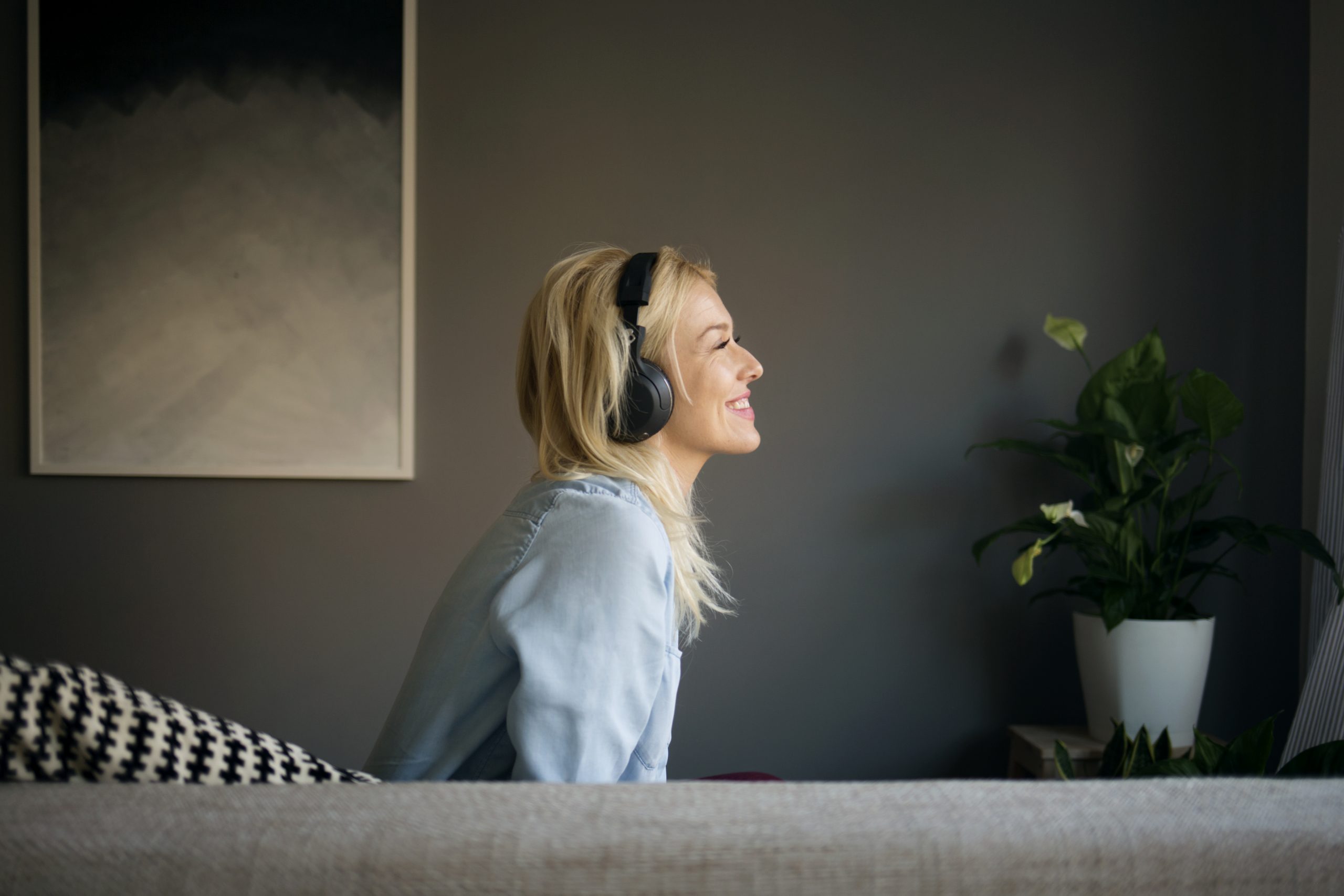 Top 5 podcasts for better mental health
Top 5 podcasts for better mental healthWill you be tuning in?
By Miriam Habtesellasie